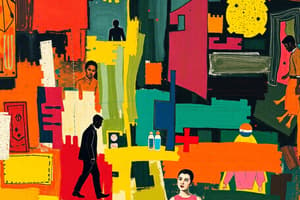Podcast
Questions and Answers
What is the main difference between primary and secondary agents of socialization?
What is the main difference between primary and secondary agents of socialization?
Primary agents of socialization refer to family and relatives, who initially socialize an individual, while secondary agents refer to institutions and groups outside the family, such as schools and peers, that continue the socialization process.
According to Karl Marx, what is the primary source of social conflict?
According to Karl Marx, what is the primary source of social conflict?
Economic class struggle between the bourgeoisie and the proletariat.
In the context of Gender Studies, what is the difference between sex and gender?
In the context of Gender Studies, what is the difference between sex and gender?
Sex refers to biological characteristics, while gender refers to socially constructed roles and expectations associated with being male or female.
What is the concept of the 'Looking Glass Self' in sociology?
What is the concept of the 'Looking Glass Self' in sociology?
What is the main idea behind the Stanford Prison Experiment?
What is the main idea behind the Stanford Prison Experiment?
Study Notes
Social Institutions
- There are 5 main social institutions that shape our daily lives.
Sociology Theories
- Functionalism: views society as a system with interdependent parts.
- Feminist Theory: focuses on the role of gender and patriarchy in society.
- Conflict Theory: emphasizes the role of power and inequality in society.
- Symbolic Interactionism: studies how individuals interact with each other and the symbols they use to communicate.
Karl Marx
- Known for his conflict theory and the concept of class struggle.
Socialization and Identity
- Cooley's Looking Glass Self: our self-image is shaped by how others perceive us.
- Socialization: the process of learning norms, values, and behaviors.
- Primary agents of socialization: family, who teach us basic values and norms.
- Secondary agents of socialization: peers, school, and media, who influence our behavior and attitudes.
Conformity and Obedience
- Asch's experiment: showed how people conform to group norms even when they know they're wrong.
- Milgram's experiment: demonstrated the power of authority and obedience to destructive commands.
- Stanford Prison experiment: highlighted the effects of social roles and environments on behavior.
Gender and Sex
- Gender: a social and cultural construct, different from sex.
- Sex: a biological characteristic.
- Intersex: individuals born with reproductive or sexual anatomy that doesn't fit typical male/female classifications.
- Gender spectrum: recognizes that gender identity exists on a continuum rather than a binary.
Agents of Socialization
- Family: primary agent of socialization, teaches basic values and norms.
- Peers: influence our behavior and attitudes.
- School: a secondary agent of socialization, with three types of curriculum: hidden, formal, and informal.
Feral Children and Family
- Feral Children: individuals who grow up without human interaction and socialization.
- Family types: vary in structure, function, and form, but all play a crucial role in socialization.
Studying That Suits You
Use AI to generate personalized quizzes and flashcards to suit your learning preferences.
Description
Test your understanding of key sociology concepts, including social institutions, schools of thought, and socialization agents. Explore topics like functionalism, patriarchy, and conformity, and evaluate your knowledge of influential studies and theories.




